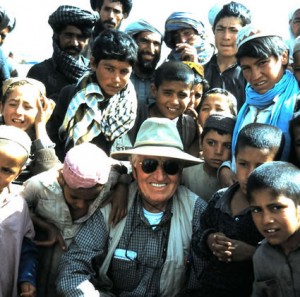Volunteering Overseas for Over 50
| With friends at IDP (internally displaced persons) camp in Herat, Afghanistan. |
I remember when President John F. Kennedy announced the formation of the Peace Corps in 1961. I thought it was a wonderful idea that arrived too late for me. I was married and had a young family and responsibilities at home. Thirty years later on October 24, 1991 I found out I was wrong. I was a Peace Corps Volunteer headed for Guatemala. It is now nearly seventeen years since that day. Although my Peace Corps experience was not everything I had hoped it would be, the doors that it opened have led to a very fascinating part of my life.
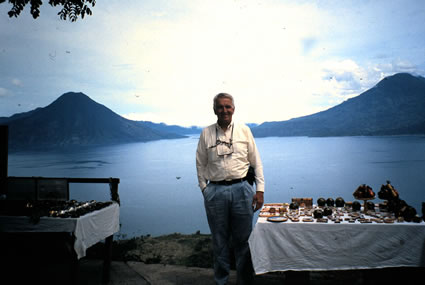 |
| Lake Atitlan, Guatemala while in Peace Corps 1992. |
In 1996, four years after leaving the Peace Corps, a former volunteer with whom I had served in Guatemala called me and asked if I would be interested in working on an election in Bosnia and Herzegovina. She said the Peace Corps was recruiting individuals to work as United Nations Volunteers. The principal requirement was some election experience. The opportunity offered work on the first post-war election in that devastated country. After some hesitation I decided to apply and was accepted. Thus began what has been, and is continuing to be, a rewarding and exciting journey. I have since worked in 14 countries and traveled to 38.
There are wonderful opportunities available to folks over 50 who wish to serve internationally. Although organizations like the Peace Corps and United Nations Volunteers require long-term commitments there are many organizations that offer shorter international volunteer opportunities. Short-term assignments are a very good way to for one to gain experience in international service and to determine if volunteering abroad is something one would like to pursue on a longer term basis. The prospective volunteer should carefully examine the programs and history of placement organizations prior to making a choice. A good fit with one’s background and goals is vital to a meaningful and challenging experience. The key is to work with an organization that has a track record and is well-organized. It should be working closely with an in-country organization to assure that its programs are providing a needed service to the communities and individuals served. It is important to talk with former volunteers over 50 years of age who have associated with the organization that you are considering. Ask them about their experiences, what their expectations were and if the organization met them. Did they feel that they made a contribution to the communities served? Did they feel comfortable with the age-mix of the volunteers and was their experience properly utilized? Regarding age-mix, one of the delights of my service is that I have, to this day, continuing friendships with former volunteers who had just graduated from college when I, at 56, was a Peace Corps Volunteer 17 years ago.
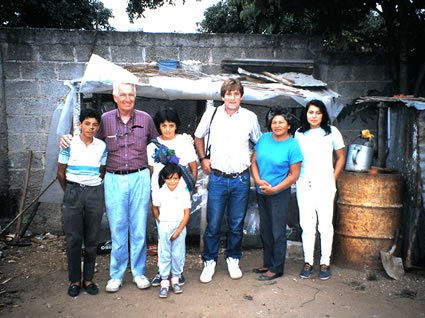 |
| Peace Corps trainees with host family in Guatemala 1991. |
There are other questions you may have when considering an organization. I recommend reading the articles in the Volunteer Work Abroad and Volunteer Vacations section of this publication.
Shorter term international volunteer assignments, with the exception of some organizations that have particular professional needs, usually require that a volunteer pay for the transportation and costs associated with the volunteer assignment. Most times these costs are tax-deductible. The volunteer should check with the placement organization and also with one’s tax advisor to determine the tax implications. There are very good reasons that the organizations charge for volunteer placements. They work, in advance, with in-country host organizations to develop programs that fulfill needs and contribute to the country of service. They travel to the program sites to set-up housing, medical care, food, transportation, insurance (if offered) and security for the volunteers. All of these tasks require time and financial resources.
When choosing a particular program it is best to select one in which you either have experience or one which encompasses long held interests i.e., hobbies, avocations. There are also many faith-based international volunteer opportunities. The new volunteer must adjust to new cultures and circumstances. A knowledge of, or deep interest in, one’s program, although not always necessary, does ease the adjustment. The positive use of one’s experience and interests can also make a greater contribution to the country of service. I must say that my observation of the Peace Corps provides a caveat to my advice. There were times when the Peace Corps seemed to assign people to specialties based on slots that needed filling rather than the individual’s experience. Sometimes it worked and sometimes it didn’t—but that was also true of some volunteers working their specialties.
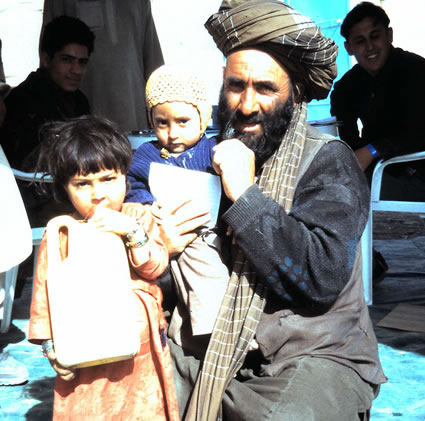 |
| IDP family, Herat, Afghaistan 2002. |
A great way to find out what your interests are is to volunteer in your community. Most large communities have organizations that recruit and coordinate volunteer activities. You can check online for websites that provide domestic volunteer information. Among the websites I find useful are: www.volunteermatch.org, www.idealist.org, and www.volunteerguide.org.
There are some unique considerations that the over 50 group must think about when planning their international volunteer service. For longer-term assignments the future volunteer needs to arrange one’s investments and financial obligations. During such assignments some volunteers rent or lease their homes and apartments. The term of the lease or rental agreement must be carefully considered. One should think about what one would do should they return home earlier than they had originally planned. Having an alternate lodging plan in mind could be helpful. The advent of online banking has made it easier to handle one’s financial obligations while away. When I first left in 1991 I hired someone to pay my bills and look after my finances. I also did this on later, long-term assignments. I now find online banking very helpful, although I do need to have someone gather my mail. The storage or sale of automobiles, furniture and personal possessions must be considered. Arrangements for pets need to be made. There may be other matters you wish to consider. There are some very good books about volunteering that include lists of things to do prior to departure. One book I find helpful is: How to Live Your Dream of Volunteering Overseas, by Joseph Collins, Stefano DeZerega and Zahara Heckscher, Penguin Books 2002.
The volunteer organizations that you choose to work with will also have important planning information for you.
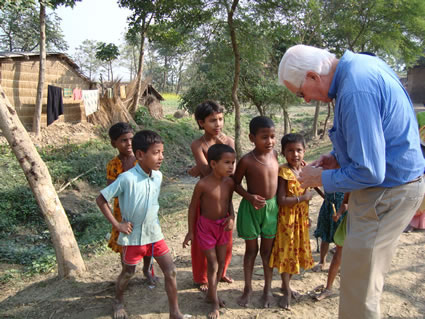 |
| Showing photos, rural village, Rajshahi, Bangladesh 2008. |
A major consideration for prospective volunteers of any age is health. Not just one’s current health but potential health risks on an assignment and the availability and quality of health care at the site of one’s program. A good place to start is with one’s physician. Get a thorough check-up and evaluation. Discuss your travel plans and destination with your doctor. Many long-term volunteer organizations will require pre-assignment health examinations. Although some long-term and most short-term organizations may not require the exams, it is good for the prospective volunteer to have a full picture of one’s health and medical needs. To determine the quality of health care at the program site the prospective volunteer should talk with the deploying organization and also former volunteers with that organization. Information about health and travel insurance should also be discussed at that time. Many organizations provide some insurance. If insurance is not provided a search of the internet will produce resources that sell the needed coverage.
One of my major concerns was what my adult children would think about my international volunteering. I should not have worried. My son and daughter could not have been more supportive. At times they seemed more excited than I. As my international experience has broadened over the years their excitement and interest has grown and endured.
After all is said and done, after all of the questions have been asked and the answers received, there is only one way to realize the truly fulfilling experience of international volunteering. You must do it! I encourage you to do so. I wish you the life enhancing pleasures that volunteering has given me and, most of all, abiding international friendships like those I now have as a result of my volunteer service.
For More InfoVolunteer OrganizationsPeace Corps: www.peacecorps.gov United Nations Volunteers: www.unv.org Cross Cultural Solutions: www.crossculturalsolutions.org Earthwatch Institute: www.earthwatch.org Global Citizens Network: www.globalcitizens.org Global Service Corps: www.globalservicecorps.org United Planet: www.unitedplanet.org World Teach: www.worldteach.org |
Note: There are other organizations that are listed in the volunteer section of Transitions Abroad and also at www.Over50andOverseas.com.
In 1991 John Dwyer at age 56, joined the Peace Corps, a decision that has led to international service in 14 countries and travel to 38 countries. After Peace Corps service in Guatemala, John served as a United Nations volunteer in the first elections in Bosnia and Herzegovina after the Bosnian War. He has subsequently worked on elections in 10 other countries. He managed camps for internally displaced persons (IDPs) in Heart, Afghanistan and did development work in Kandahar, Afghanistan. He continues to work internationally. John has a website, www.Over50andOverseas.com, which is a resource for individuals over 50 who wish to volunteer internationally. John also hosts the The Contrarian Traveler: A website for those who are seeking unique, fulfilling travel experiences. The resource site emphasizes unique and budget friendly travel opportunities.

